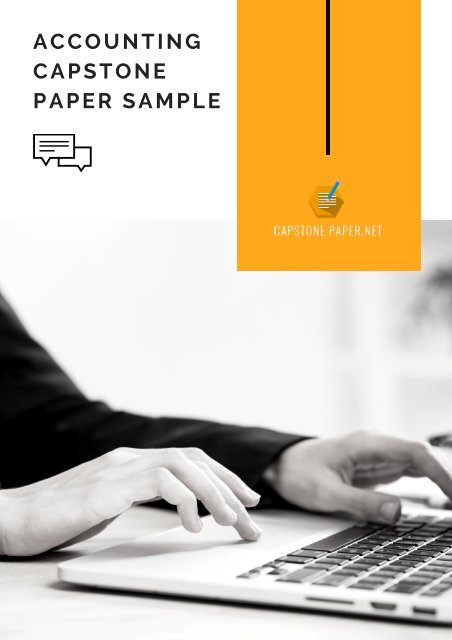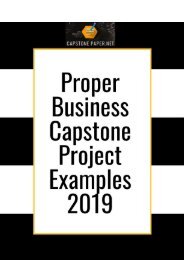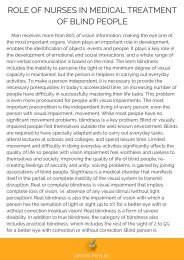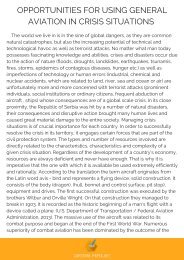Accounting Capstone Paper Sample
Have no idea how to write accounting capstone paper? Follow this link and find amazing accounting capstone paper sample https://www.capstonepaper.net/
Have no idea how to write accounting capstone paper? Follow this link and find amazing accounting capstone paper sample https://www.capstonepaper.net/
- No tags were found...
You also want an ePaper? Increase the reach of your titles
YUMPU automatically turns print PDFs into web optimized ePapers that Google loves.
A C C O U N T I N G<br />
C A P S T O N E<br />
P A P E R S A M P L E
ACCOUNTING CAPSTONE PAPER<br />
Abstract<br />
The popularity of online tax return software is growing, but at the same time,<br />
so are the doubts regarding its efficiency and the ability for these software<br />
programs to maximize tax returns while lowering the payable amount. In<br />
many instances, the ability for processing software to account for the<br />
nuances of different sources of income and deductions can either miss or<br />
misrepresent situations used in calculating taxable income, resulting in<br />
inaccurate returns and sometimes even unnecessary audits. Often, the cost<br />
of preparing individual tax returns through software purchases can be<br />
comparable to that of hiring an accountant, so the question remains as to<br />
which one is a better and more consistent choice for the general population.<br />
Through processing similar returns by hand and through five commonly used<br />
tax software, we sought to determine the accuracy and the adaptability of<br />
both these systems of tax accounting.<br />
Introduction<br />
Since the advent of computers, software advances have allowed<br />
individuals and even companies to file taxes themselves, without the need<br />
for hiring additional accounting professionals. However, as these programs<br />
have become more sophisticated and now can even retrieve forms directly<br />
from banks and employers, questions have arisen as to the true accuracy and<br />
capabilities of these software to maximize tax deductions and lower the<br />
amount owed. Accountants study financial law throughout their time in the<br />
degree program, and have dedicated their careers to understanding tax<br />
regulations and how to represent different accounts and assets. Both<br />
accountants and tax software can calculate taxes owed and prepare a tax<br />
return for the individual, and we sought to examine which one would yield<br />
the best return in real life situations.
Results<br />
Utilizing tax returns from twenty individuals, randomly selected for income<br />
and assets, we compared tax return fillings by five different accountants<br />
versus the returns from five different tax calculation software. In six out of the<br />
twenty cases, the accountants calculating tax returns by hand were able to<br />
maximize the amount of deductions for the individual, netting a higher tax<br />
refund than that calculated by the software. In seventeen cases, both came<br />
out to the same amount. In only one of the twenty cases did the software<br />
calculate a higher tax return than that of the accountants. We also examined<br />
the variability of calculations between tax-filing software as well as between<br />
accountants in order to assess the reproducibility and reliability of results.<br />
Within the software group, the variability margin of error ranged from 2% to<br />
125%, based on a failure of one of the software programs to recognize a<br />
specific deduction that would have saved the filer hundreds of dollars on<br />
their return. Between accountants, the variability of final return vale<br />
measured in percentage margin of error ranged from 5-27%.<br />
Conclusions<br />
Given that in this study, the accountants typically performed better or<br />
similarly to tax software in terms of calculating return, having taxes done by<br />
hand can increase an individual filer’s chances of getting a larger refund.<br />
Further analyses showed that in all six cases where hand calculation fared<br />
better than the tax software, the individuals had large numbers of itemized<br />
deductions as well as different types of assets, which can be difficult or even<br />
impossible to account for with software. Additionally, in one case, the<br />
software failed to take into account a deduction for Fishing Income in a<br />
specific locale, which resulted in $349 in additional taxes for an individual.<br />
The variability between different tax software was very large, indicating that<br />
different methods of calculations are being utilized, and possibly that<br />
individual perceptions of questions utilized in tax software can impact the<br />
machine’s decision to implement a deduction or not. On the other hand, an<br />
accountant has individual tax forms in hand, and can process them according
to their experience in minimizing the taxable income. In this case, it is<br />
apparent that calculating taxes through an accountant generally yields a<br />
more accurate return and avoids some of the inconsistencies between tax<br />
software. Additionally, for those seeking to utilize tax software due to its cost,<br />
the individual financial expenditure for the software and the time needed to<br />
file is comparable to that of utilizing traditional accounting services. Thus, our<br />
research shows that filing taxes through an accountant can help to maximize<br />
tax benefit and minimize the amount of taxes owed.
REFERENCES<br />
"Corporate Income Tax: Overall Statutory Tax Rates on Dividend Income<br />
(Edition 2017)." OECD Tax Statistics, 2017. doi:10.1787/9886c45e-en.<br />
Ishi, Hiromitsu. "Tax Administration and Tax Equity." The Japanese Tax<br />
System, 2001, 53-72. doi:10.1093/0199242569.003.0004.<br />
Ryans, Abagail. "Income Tax Calculations in a Digital Age." Studies in<br />
American Finance, 2006, 13-22. doi:10.1082/0197234758.003.00052.<br />
Snyder, Samuel. "Effectiveness and Accuracy of TaxAct." <strong>Accounting</strong><br />
Advances, 2009, 252-266. doi:10.1723/0690396528.067.00002.

















